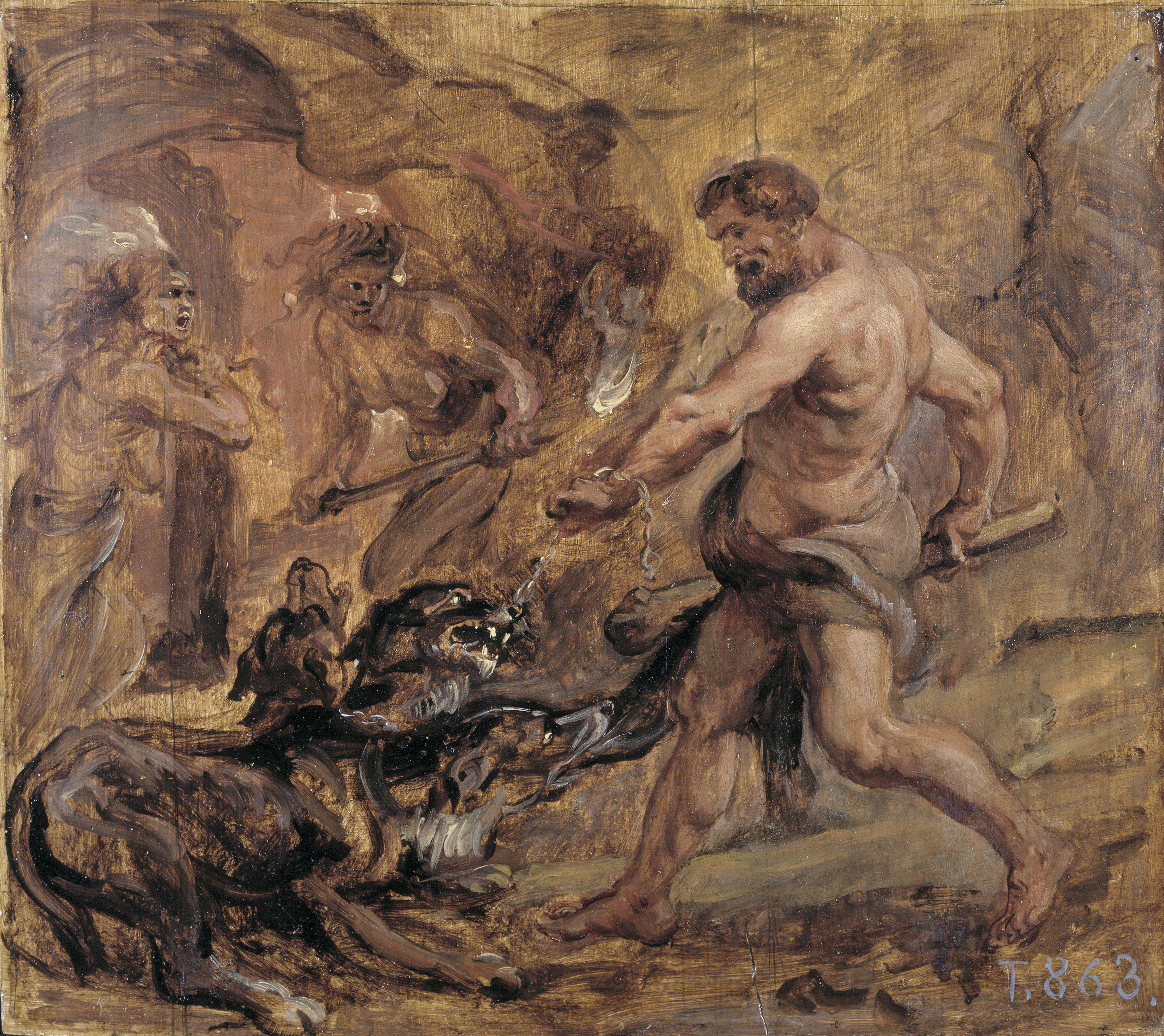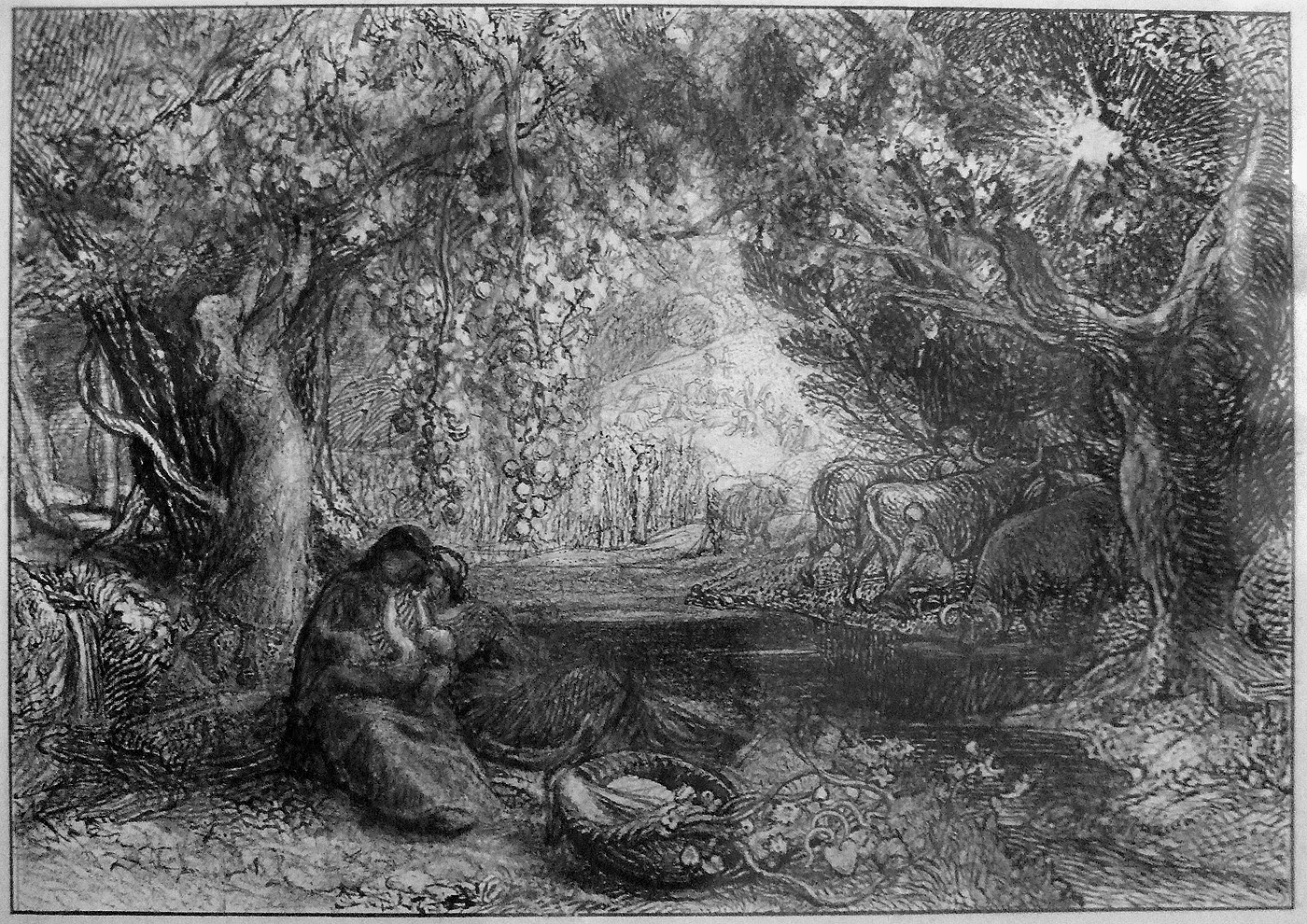The Labors of Hercules
Wheelock: Chapter 20
Quis nōmen Herculis nōn audīvit? Dē magnīs factīs illīus nunc pauca dīcam.
Herculem, virum Graecum cuius vīrēs erant extraōdināriae, in servitūtem fortūna dūxerat. Eurystheus eī miserō duodecim gravēs labōrēs dederat. Sed Herculēs metū nōn victus erat; neque novīs animālibus terrērī poterat, neque ab hominibus eius generis quod numquam sceleribus caret. Magnum leōnem sōlīs manibus Herculēs superāvit; celerem cervam, cuius cornua aurea erant, cēpit et ex eō locō in quō eam invēnerat Mycēnās trāxit. Deinde ille missus est ab Eurystheō contrā Cerberum, ācrem canem; etiam hunc āmovēre poterat ab ipsā portā Plūtōnis!
Post haec et alia facta Herculēs labōribus līberātus est. Quod autem praemium eī datum est? Nūllum. Quī erat frūctus labōrum eius? Glōria memoriaque perpetua in versibus poētārum.
[1]: Herculēs, -is: Hercules
[2]: Eurystheus, -eī: Eurystheus, king of Mycenae, cousin of Hercules;
[3]: Mycēnae, -ārum: a city in Greece
[4]: Cerberus, -ī: Cerberus

Translation:
Who have not hear the name of Hercules? I am telling a few about his great achievement right now.
The fate led Hercules into servitudes, a Greek man whose strengths were beyond the norm. Eurystheus gave twelve burdensome works to unfortunate him. But Hercules was not conquered by the fear; neither he could be terrified by the new souls nor by the men of his stock (Eurystheus) who is never without wickedness. Hercules conquered the great lion only by hands; he caught the heaven deer, whose horns were golden, and dragged it away from the place where he found it to the city Mycenae. Then he was sent by Eurystheus against Cerberus, a violent dog; he could also take it away from the gate of Pluto!
After these and other achievements Hercules is free from works. However, what price is given to him? Nothing. What was the fruit of his works? The eternal glory and memory in the poets’ verses.
The Golden Age Returns
Wheelock: Chapter 21
Nunc aetās magna atque nova incipit. Puer nāscitur ac gēns aurea venit. Mundus gravī metū līberābitur. Ille puer deōrum vītam accipiet deōsque vidēbit, et ipse vidēbitur ab illīs. Mundum reget antīquīs virtūtibus. Simul atque laudēs et facta parentis legere et virtūtem scīre poterit, agrī beātī dulcēs frūctūs omnibus hominibus parābunt. Remanēbunt tamen pauca vitia quae hominēs temptāre mare nāvibus, quae hominēs cingere urbēs mūrīs iubēbunt. Erunt etiam altera bella, atque iterum Trōiam magnus mittētur Achillēs. Ubi autem hunc puerum virum fēcerit fortis aetās, maria relinquentur ā vectōribus, nec nautae pecūniae causā mercēs mūtābunt. Rōbustus agricola taurōs iugō līberābit; nōn rāstrīs tangētur humus; omnis terra omnia feret.
adapted from Vergil, Eclogues 4.4-39
[1]: Trōius, -a, -um: of Troy, Trojan; a city of Greek in Anatolia
[2]: Achillēs, -is, m.: Achilles, greatest Greek hero during the 10-year war against the Trojans
Translation:
Now a great and new age begins. A boy is born and the golden race comes. The world will be liberated from the severe fear. That boy will receive the life of gods and will see gods, and he himself will be seen by them. He will rule the world with ancient virtues. And at the same time he will be able to read the praises and achievements of his parents and to perceive the virtues, and the blessed lands of sweet fruits will prepare for all the human beings. However, a few evils will remain, which will order the man to try out the sea by ships and which (will order) humans to encircle the city by walls. Other wars will be, and therefore, once more the great Achilles will be sent to Troy. However, as soon as the mature age will make the boy a man, the seas will be abandoned by the carriers, nor the sailors will exchange the goods for the sake of money. The robust farmer will free the bulls from the yoke; the earth will not be touched by rakes; all (the earth) will bear everything.

Cicero Reports His Victory over Catiline
Wheelock: Chapter 22
Rem pūblicam, ō cīvēs, vītam omnium vestrum, bona, fortūnās, domum senātūs atque hanc pulchram urbem hōc diē labōribus, cōnsiliīs, perīculīs meīs ex igne atque ferrō ēripuī. Nunc, ō cīvēs, quoniam malōs ducēs malī bellī captōs iam tenētis, cōgitāre dēbētis dē bonā spē vestrā. Catilīna ex urbe mediā expulsus est. Erat ille quī timēbātur ab omnibus, tam diū dum urbis moenibus continēbātur. Nunc ille homō tam ācer, tam audāx, tam in scelere vigilāns, tam in malīs rēbus dīligēns, sublātus est. Quamquam haec omnia, ō cīvēs, sunt ā mē administrāta, videntur tamen imperiō atque cōnsiliō deōrum immortālium et gesta et prōvīsa esse. Nam multīs temporibus dī immortālēs spem fidemque huius reī pūblicae aluērunt. Hōc autem tempore praeclārissimās eīs grātiās agere dēbētis. Ēreptī enim estis ex crūdēlissimā ac miserā morte, ēreptī (estis) sine caede, sine sanguine, sine exercitū.
Memoriā vestrā, ō cīvēs, nostrae rēs alentur; laus, fāma, glōriaque valēbunt; litterīs vīvent remanēbuntque. In perpetuā pāce esse possumus, ō cīvēs.
adapted from Cicero, In Catilinam 3.1, 16-18, 23, 26, 29
Translation:
O citizens, I have taken away the republic, all your life, goods, fates, the palace of senate and the beautiful city today out of the fire and sword with my labors, plans and myself in dangers. Now, O citizens, since now you are also holding the bad leaders of the evil war captured, you should ponder on your good willing. Catiline has been expelled from the middle of the city. He was that one who was feared by everyone so long as he was held in the walls of the city. Now that man, so harsh, so bold, so vigilant in the crimes, so careful in evil things, has been suffered. Although these all, O citizens, are managed by me, however they seem to have been administered and provided by the power and also plan of the immortal gods. For in many times the immortal gods supported the hope and faith of this republic. However, in this time you should give the most glorious thanks to them. For you are taken away from the most cruel and miserable death, taken away without massacre, without bloodshed, without army.
Your memory, O citizens, our deed are supported by. The praise, fame and glory will make it strong; they live and remain in the letters. We can be in an eternal peace, O citizens.
